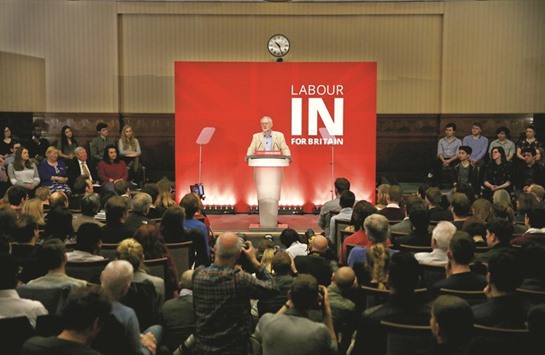Opposition leader Jeremy Corbyn yesterday made his most impassioned plea for Britain to stay in Europe, saying the socialist case for the EU had dispelled his long-held suspicion of the bloc.
Labour leader Corbyn, who voted against EU membership in a 1975 referendum, said he was now a supporter of the protections it offered workers, consumers and the environment.
“There is nothing half-hearted about what we are doing,” he said during his first major speech on the issue ahead of a June 23 referendum that polls show could go either way.
“A vote to stay in is in the best interests of the people of this country,” added the 66-year-old, who said he had held “lengthy conversations” with European leaders on the EU’s contribution to social justice, the environment, climate change and trade.
However, the veteran socialist admitted that he remained “very critical” of the European Union’s “shortcomings,” having previously criticised its free-market model.
“The case I’m making is for remain and reform,” he said.
“Europe needs to change but that change can only come from working with our allies in the European Union to achieve it,” he said. Corbyn has previously stated that Labour would support a “Remain” vote but the campaign has been criticised as lukewarm at best, reflecting his lifelong antipathy towards the European project.
Some experts have also said Corbyn may be holding back since the referendum debate is proving so damaging to Prime Minister David Cameron’s Conservative Party, which is divided on the EU.
Hinting at the political calculations afoot - rather than outright support of the union - Corbyn said that he had changed his mind on the EU because “the Labour Party and the trade unions have come to the view that they want to campaign for a just Europe”.
“Labour is not going to fight a big campaign and is not going to spend any money on this campaign,” said Simon Hix, professor of European and comparative politics at the London School of Economics. Hix said that if Labour performs badly in regional elections next month, they may “not fight any campaign at all” for the referendum since such a setback would reflect anger at an influx of European workers into Britain.
Cameron has mocked Corbyn as a far-left relic since he took over the Labour Party last year, but is now in the unusual position of needing his rival’s help to salvage his reputation.
“If this referendum is going to be won by the government, it’s essential that Labour mobilise its voters to turn out actually to vote,” Sara Hobolt of the European Institute at the LSE, said.
A Brexit would be disastrous for Cameron’s reputation, but the prime minister has suffered from a row over his tax affairs, leading to a tightening in polls ahead of the vote.
Brexit ‘could put 100,000 financial jobs at risk’
A vote by Britain to leave the European Union could mean up to 100,000 job losses in the country’s financial services industry over the next five years, a study said yesterday. If Britain voted for Brexit in a June referendum this would lead to lower growth and investment and undermine London’s position as a leading centre of trade and commerce, according to the study, commissioned by TheCityUk, which represents the City of London’s finance industry. Many international banks use Britain to gain access to the single market and as a base from which to sell financial products and services across the region. The threat of Britain leaving the EU could prompt them to rethink that structure. “The balance of factors that influence companies’ location decisions could tip in favour of relocation of some activities to other EU financial hubs,” the report said. Financial services currently account for around 10% of the economy, a larger share than in other big economies.

Opposition Labour Party leader Jeremy Corbyn gives a speech on Britain’s membership of the European Union in London, yesterday.
